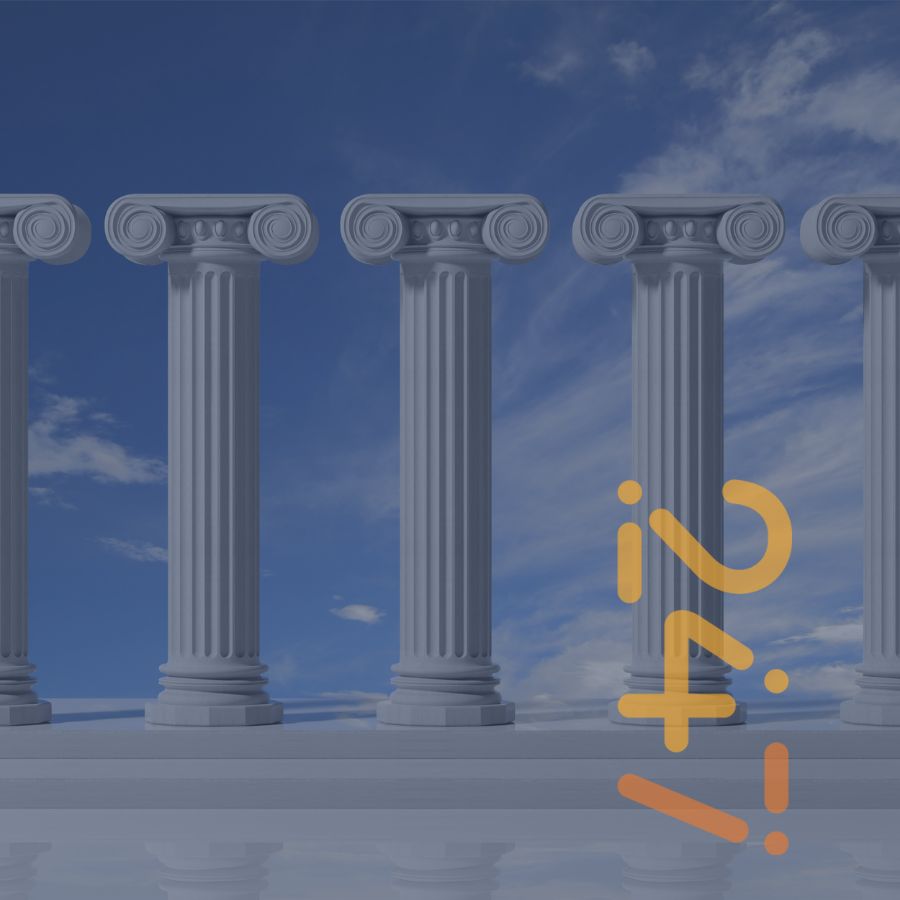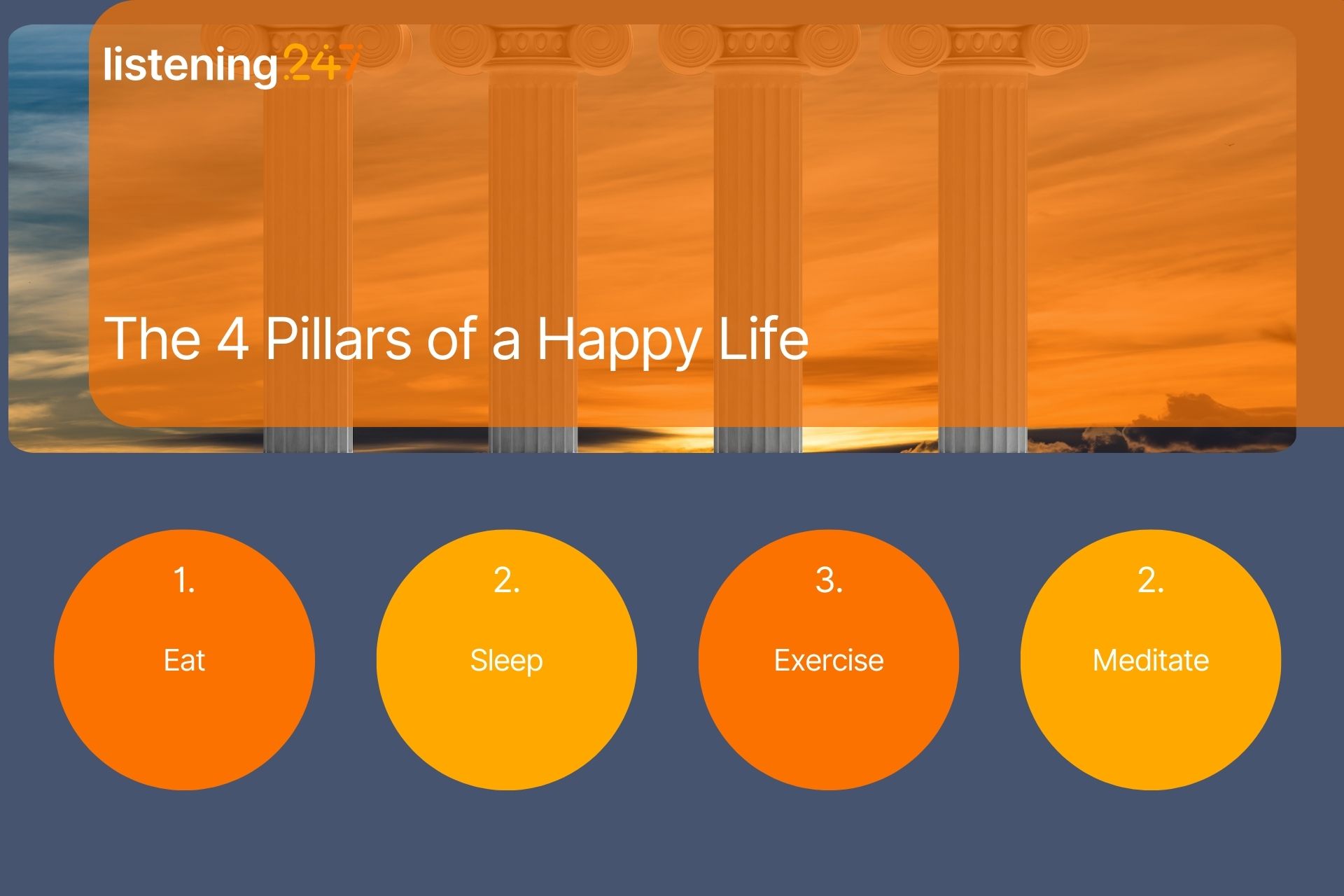
Blog Post
The 4 Pillars of a Happy Life

I posit that the four pillars of a happy life are encapsulated in these 4 verbs:
- 1. Eat
- 2. Sleep
- 3. Exercise
- 4. Meditate
Let's call them the Big 4!
Before you go on reading I should clarify that I am not an expert in any of these four categories, I am just very interested in them thus I read and experiment a lot with a single research subject: myself.
Since my day job is running listening247 you may wonder what this subject has to do with data analytics and market research. In case you don't know much about what it is that we do: we developed an A.I. based data analytics & market research platform that helps our blue chip clients make data driven decisions. This capability delivers high fidelity unstructured data by integrating social intelligence with surveys and customer purchases or other transactional data.
As you may have noticed, this is a category on our blog called ‘human connections’. The point of this category is to communicate that a consumer or a respondent is first and foremost a human being. In order for us as researchers to understand why consumers buy a brand, we need to have a deeper understanding of how their brain works and all the motivations that make a human tick.
Just over a year ago I published an article on whether market research adds value to the quality of human life. That article was about what humans need in order to stay alive and functional, with needs like love, sex, fulfillment, spirituality and entertainment falling under a super category called the pursuit of happiness. At the time I wasn’t sure what to do with health, and of course needs like air, water and food topped the list of 11 categories, with health coming in 5th place.
Twelve months, a couple of books and many articles later, I am seeing things from a different lense; a more holistic, more crisp view about the human condition. Let's discuss the big 4 individually and hope we get to some conclusions by the end of this article.
1. Eat
We are what we eat… quite literally, if by we, we mean our body. Many of you who frequent Medium may have seen the documentary Game Changers on Netflix, which strongly recommends a plant-based diet for humans. Many called it one-sided, which objectively it is - but this does not mean the message is wrong. Some called it vegan propaganda. The very fact that the producers chose a much less controversial description instead of Veganism - which sounds like a cult - and went with “plant based diet” was also considered a calculated PR move.
Now add intermittent fasting to a plant based diet and you have a super formula for a super healthy body including brain function improvements; at least this is what the result feels like the result with the one subject of my research (me). It has to be said that intermittent fasting is not for everyone, for example it is not suitable for people with eating disorders. On the positive side according to Dr. Mark Mattson, a professor of Neurology at John Hopkins University, fasting has been shown to increase rates of neurogenesis in the brain (Article of Dr Brady Salcido on Medium).
Our gut microbiome is credited with a lot of power over our wellbeing. The nervous system in our gut is constantly in communication with our brain letting it know the state of our body in real time. Our immune system has a strong dependence on the good bacteria in our gut. “Using your gut feeling” is not just a figure of speech, there is more to our gut than we think.
Here is a fun fact: Most Koreans eat kimchi (fermented cabbage) every day… can anyone guess why?
2. Sleep
In order to recover and rejuvenate, a human needs a minimum of 7 hours of quality sleep every night. Most of it should be light sleep but we need at least 4-5 sleep cycles between Light Sleep, Deep Sleep and Rapid Eye Movement (REM). This is the time when muscles recover after exercise and the brain gets rid of harmful toxins that build up during awake time.
Without enough of it we get sick and it is actually possible to die due to lack of sleep.
In a pyramid of health often circulated in fitness circles, you will notice that neither exercise nor nutrition are at the base of the pyramid; sleep is!
3. Exercise
In their book Younger Next Year Chris Crowley and Henry Lodge M.D. recommend going to the gym 6 days a week in order to turn back your biological clock.
Apparently after the age of 30, we lose 3-5% of our muscle mass every decade.
Adding muscle mass not only makes you stronger but it also improves your metabolism and passes on a message to the brain that not only are you not heading to your grave, but you are actually going in the opposite direction; getting younger like Crowley & Lodge posit in their book.
Now if we think about Alphabet’s Calico and the Human longevity projects which aim to extend human life (some say to reach 750 years which effectively means eternal), we have an extra incentive to exercise and be healthy so that we can reach “longevity escape velocity”. This is a concept of the life extension movement which implies that life expectancy is extended at a rate faster than the time passing e.g. for every year that passes we find ways to extend life for a year and 1 day or 1.5 years or longer. This has not happened yet.
It may be as simple as endorphin induced euphoria after a gym session, if only it wasn't short lived; the same feeling of euphoria can be replicated with the use of opioids by the way.
4. Meditate
Scientists Daniel Goleman and Richard Davidson in their book “The Science of Meditation” lay out evidence that meditation can induce lasting positive traits in the human brain; from better attention and vigilance, to an improved immune system and reduced brain atrophy after the age of 50. There are still not enough MRI scans of the brains of Yogis from the Himalayas to provide solid proof for all the assumed benefits of meditation, but those brain scans that are available strongly hint that the benefits are real.
Permanently altered traits - including longer time functioning in gamma frequency which apparently has multiple health benefits - are accentuated once you achieve over 1,000 hours of lifetime meditation. Like in every other skill such as playing tennis, the violin or football you become world class (possibly a yogi) with over 10,000 lifetime meditation hours!
It is the devil’s advocate’s turn now...
When you read what comes next you may be reminded of Jekyll & Hyde. So here goes my alter ego:
How could anyone think that happiness is as simple as 4 pillars which dictate black on white actions that can lead to plausible results?
Happiness is so elusive that even the founding fathers of the USA wrote about the “pursuit of happiness” in their constitution. They made it sound like it is a continuous chase of a mythical state that no one has ever achieved - similar to Buddha’s enlightenment.
One thing is for sure though, having no needs and expectations helps. The complete fulfilment of our needs ended when we exited our mothers’ womb. The perfect supermarket… whatever we needed was delivered to us at the blink of an eye. Everything went downhill on exit; we all tried our very best to tell the people in the room at the time, but no amount of crying made any difference.
It is simple really: if we want something and we can’t have it we are unhappy; when we get it we are happy for 2 seconds and then on to the next thing that we want but cannot have.
Some Indian yogis/sages talk about high thinking and simple living.
The 4 verbs, if that’s all we did in our lives would describe a simple life with low expectations and a higher probability of not being unhappy for a longer period of time. When the big 4 are applied to a complex life with high aspirations, sadly they are not sufficient for a happy life; they can lead to a less frantic life which is a step in the right direction, but what about the other 9 million steps to happiness?
The big 4 contribute toward a healthy life which is a precondition for happiness; but they are not enough. If you are sick, whatever else you have will hardly move the happiness needle - unless of course you are a stoic.
I think I am losing my own argument. It is obvious I need some help from professional philosophers...
I’m ending this article with the Stoic take on happiness which is very easy to understand and agree with, but extremely difficult to implement; in a nutshell:
“focus on what you can control accept what you can't”
“No person has the power to have everything they want, but it is in their power not to want what they don’t have, and to cheerfully put to good use what they do have.” – Seneca
“Curb your desire—don’t set your heart on so many things and you will get what you need.” – Epictetus
Maybe brands can play a role in giving humans what they need to be happy; especially if they fulfill one of the basic needs discussed here and if they elicit one of the 14 human emotions that the listening247 proprietary emotions detection model includes.
I think the conclusion is: the stoics get it and maybe a few friends from the Young Presidents Organization (YPO) as well the market researchers and data scientists at listening247.
What do you think?
Originally published by Michalis A. Michael on Medium.